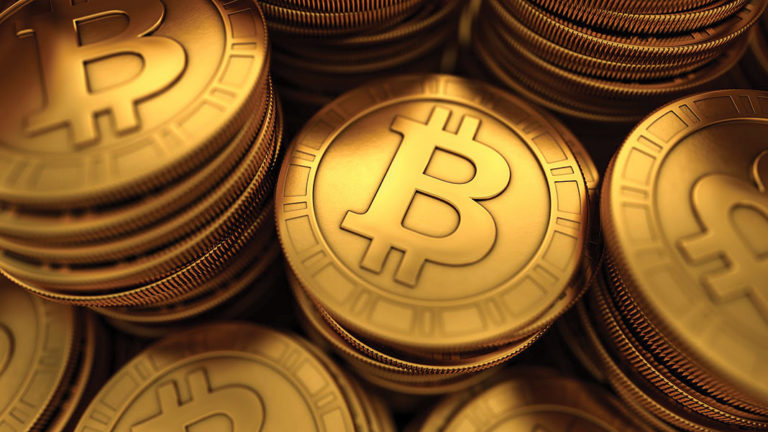By Krishna Kumar Mishra & Shabahat Manzoor A.
Bitcoin has gained popularity over the last few years, but there was a sudden spike of interest in the wake of demonetization. Since it is a complex technology and there is a complete lack of knowledge the few scammers tried to take advantage and in the guise of blockchain mining schemes launched traditional Ponzi / Multi-Level Marketing schemes promising fixed returns. It gave Bitcoin a bad publicity. But it also compelled the crypto currency industry to come together to launch Digital Asset and Blockchain Foundation of India (DABFI) to lay down self-regulatory regimes. Certainly Bitcoin being a new concept will have to pass many tests. It will also take some time due to its volatile nature before it could be a part of an investor’s portfolio.
It is important for a country like India that this technology is understood without any prejudice. It may take a few years before the world economy accepts its use widely. Technology doesn’t take years to be adopted so the day is not far off. It makes the need more urgent that appropriate regulatory regime is developed soon so that the country does not miss out from this vast opportunity. No effort should be put to throttle this business.
“The first generation of the digital revolution brought us the Internet of information. The second generation — powered by blockchain technology — is bringing us the Internet of value: a new platform to reshape the world of business and transform the old order of human affairs for the better.” – Don Tapscott, author of The Digital Economy
The Indian Bitcoin industry is impatiently waiting the possible outcome of an inter-ministerial committee meeting to be held on April 20. The committee was recently installed by the Parliament to study the legality of the cryptocurrency and it is expected that the government could declare its position on that day about the legality of Bitcoin. However, as it stands, Bitcoin buying, selling, trading or mining is not illegal by any law in India. Any decision that ruled the cryptocurrency to be illegal would mean that India’s nascent but growing Bitcoin industry will have to shut down. Since the government is promoting technology, innovation, and financial inclusion, the chances are unlikely.
Right now to understand its position it would be better to refer what Arjun Ram Meghwal, Minister of State for Finance said in the Rajya Sabha on March 28, 2017: “The use of virtual currencies like Bitcoins is not authorised by the RBI and could result in breach of anti-money laundering provisions. The RBI had cautioned users, holders and traders of virtual currency, including Bitcoin, about the potential financial, legal and security risks arising from their usage. The absence of counter parties in usage of virtual currencies, including Bitcoins, for illicit and illegal activities in anonymous/pseudonymous systems could subject the users to unintentional breaches of anti-money laundering and combating the financing of terrorism laws.”
Earlier Kirit Somaiya, MP, raised concern in the Parliament that the “use of Bitcoin, a hypothetical currency, is increasing at a rapid speed. Experts have expressed concern that Bitcoin is a pyramid Ponzi-type scheme. This issue should be taken very seriously and there is an urgent need to have a study on the development of Bitcoin in India. There is no regulator. As it is functioning like currency and seems like Ponzi scheme, RBI and SEBI as well as Finance Ministry to take appropriate step to save the people from another big Ponzi fraud.”
In fact, in the wake of demonetization many people got curious about Bitcoin. Allegedly huge cash was transferred and legalized giving a bad publicity to Bitcoin. The price of Bitcoin on 8th November, the day Prime Minister Narendra Modi announced, was around Rs 51000 which moved to around Rs 65000 within a fortnight, roughly 30% up. It indicates many people converted old cash into Bitcoin. To take the full advantage of this sudden attraction some unscrupulous elements in the name of Bitcoin mining schemes assured a fixed return in Bitcoins to their investors. Some even promised returns as high as 12% of Bitcoin investment a month. Suddenly these schemes became very popular. These con men created Multi Level Marketing (MLM) schemes and in a very short span of time cheated several (greedy) people. This number will certainly not be in the thousands, but it has brought attention and Bitcoin was maligned in the public mind. These greedy people could do nothing as Bitcoin is not regulated in India.
Mining is the way to bring new Bitcoin into existence. It involves very complicated, difficult and probabilistic computation on a set of data known as blocks. The first node (A participant in the Bitcoin network) which solves the block on the mining network is rewarded a new Bitcoin. Mining requires very expensive specialized machines and large amounts of electricity. At present China is the favorite destination of miners because there are high altitude cold places where they get cheap electricity.
However, in spite of such instances it seems for India this is the right time to understand Bitcoin-Blockchain concept since the world is adopting it in a big way.
Blockchain
Bitcoin is just one application of Blockchain technology. The technology has multiple forms and can not only change the way money is looked upon, but also alter the payments landscape, given the promise of a decentralized transaction ecosystem. Using this technology participant can transfer value across the internet without the need for a central third party. The transactions are not anonymous as a transaction record is created, but identifying information is encrypted and no personal information is shared. Blockchain is in the process of revolutionizing banking, security markets, IT services, insurance, supply chain and e-governance to name a few. There are a few startups in this space doing wonderful work like Auxesis, Coinsecure, EzyRemit and Trestor.
An experiment on the lines of Blockchain is the launch of the Unified Payments Interface (UPI) which is developed by the National Payments Corporation of India. Mahindra and IBM have joined hands to develop Blockchain Solution for Supply Chain Finance which will enable Mahindra Finance access transactions recorded on a shared ledger in near real-time, enabling it to develop and offer new products to small and mid-sized enterprises. This cloud-based application is designed to transform supplier-to-manufacturer trade finance transactions through a permissioned distributed ledger. ICICI bank has also adopted Blockchain in a push for digitalizing banking. At present all major financial institutions, including Goldman Sachs, Barclays, Morgan Stanley, BNP Paribas and JP Morgan are exploring the application of the Blockchain to their businesses. That means India has no problem with the technology.
2008 subprime mortgage crisis and the birth of Bitcoin
Most of the world is using fiat currencies, currencies that are issued by a government. These currencies have a central regulatory body which issues them. Bitcoin is a cryptocurrency because it uses cryptography to manage the creation of new units as well as secure the transactions. The striking feature is it weeds out the need for a trusted third party, such as a governmental agency, bank, etc. The rate at which units are created is defined beforehand and is publicly known unlike the traditional currencies where the government or the authorized banks control the supply. The production is designed to gradually decrease, eventually placing a cap on the number of units that will ever be in circulation.
Bitcoin is the first implementation of a concept called “cryptocurrency”, which was first described in 1998 by Wei Dai, suggesting the idea of a new form of money that uses cryptography to control its creation and transactions, rather than a central authority. In the aftermath of the 2008 crisis, when the glut of currency backed with little or no economic productivity led to a global recession, a paper by Satoshi Nakamoto was published online describing the bitcoin for the first time. In his opinion the major problem with conventional currency today was that trust was required to make the system work. His argument was that while looking at the history of fiat currencies one can see that it is full of breaches of such trust. His Bitcoin Software would allow its users to send money over the internet directly to each other without an intermediary and no outside party could create bitcoin, entirely cutting out the role of central banks and governments in online transactions. So everything is based on crypto proof instead of trust. And unlike banks which print more money whenever it deems, the bots that are currently creating bitcoin are supposed to stop doing so in or around 2140 according to their programming itself. Unlike fiat currencies whose value is derived through regulation or law and underwritten by the state, bitcoin derive their value through the simple principles of supply and demand – they have no intrinsic value. Satoshi created a system wherein these currencies could be created (mined) by those who could solve some complex algorithmic equations. Every bitcoin transaction is recorded and verified in an open ledger called block-chains. Satoshi left the project in late 2010 without revealing much about himself. The community has since grown exponentially with many developers working on bitcoin.
Within a couple of years around February 2011, bitcoin achieved dollar parity and was now being accepted all over the world as a mode of payment for a plethora of products. During the same year it suffered a security breach in one of the largest bitcoin exchanges and crashed only to bounce back stronger than before. Bitcoin is not the only cryptocurrency. Ethereum is probably the second largest cryptocurrency in the world after Bitcoin. If more merchants and businesses start accepting bitcoin as a method of payment, users will have places to spend them and that will help drive adoption of bitcoin.
Volatility & Faulty price discovery
Bitcoin prices are discovered through exchanges – or determined largely by unregulated pools of investors. Volatility will also be an inherent part of bitcoin simply, because only 21 million bitcoins can be mined in all. About 16 million is reported to be mined already. As the number of bitcoins mined reaches the upper limit, the value is expected to shoot. One bitcoin could be purchased for $5 in 2011; in November 2013 it went up $1,000. A lot of excitement had prevailed in 2013 and 2014, followed by the revelation of a series of scams and the value crashed. But again by early 2016 it was back to $450 and on January 4, 2017, the high was $1,140. The main reason for this volatility is that the price is based just on the demand and supply in numerous unregulated exchanges around the world.
Using Bitcoins
You have to first acquire a bitcoin wallet through one of the sites buying and selling bitcoins. Then you have to transfer funds from your bank to the wallet, which can then be used to buy bitcoins. The bitcoins can be stored in the wallets, on your desk-top or mobile, or in the cloud until put to use. Bitcoins can be used to buy products and services from various websites, including Microsoft and Dell. Many gift cards can be purchased with bitcoins that can, in turn, be used on online retail stores such as Amazon, Walmart and Target.
Legal and illegal use
The nascent digital currency has been criticized as a vehicle for a range of nefarious characters from drug dealers to tax evaders to operate. The currency is used to move money across the globe quickly and anonymously and is free of control from any central bank or government, making it attractive to those who want to get around capital controls.
It is common in India for important breakthroughs, like Internet, to be perceived as being controversial before their benefits are understood. Money has always been used both for legal and illegal purposes and Bitcoin is money. However it is designed to be a huge step forward in making money more secure and could also act as a significant protection against many forms of financial crime as it is completely impossible to counterfeit and users are in full control of their payments. Bitcoin transactions are also irreversible.
Regulators, including the Reserve Bank of India, have issued cautionary notices to users, highlighting the risks they take in dealing with these currencies. This causes a problem for bitcoin users too. If the user suffers a loss due to an exchange or the dealer deducting unfair transaction charges, he has no one to complain to. The Deputy Governor of the RBI, R. Gandhi, while giving a keynote address in March at a fintech conference stated that bitcoin has value and is eliminating currency. But he also gave several reasons why digital currencies that are not backed by the government will fail to achieve mass adoption. He said that the confidence in bitcoin, or any other digital currencies based on a Blockchain, is limited to its early adopters and those who are more comfortable with risk. He was very correct.
The lack of regulation and acknowledgment by authorities has led to the bitcoin startups Zebpay (Saurabh Agrawal), Unocoin (Sathvik Vishwanath), Coinsecure (Mohit Kalra) and Searchtrade (Rashmit Gupta) to jointly launch Digital Asset and Blockchain Foundation of India (DABFI), a kind of self-regulatory body and watchdog for the cryptocurrency industry. International law firm Nishith Desai Associates has been tasked to develop self-regulatory regimes for trading of bitcoins and other blockchain based digital assets. Equipped with strong framework and norms DABFI will liase with regulators and get clarity on taxation.
Meanwhile a petition, to be delivered to Finance Minister and RBI governor, urging the parliament to label bitcoin and cryptocurrencies as legal by definition has garnered over thousands of signatures. The petition says it is advisable to stop bad actors, not the technology. With infrastructure technologies like the Internet, the smartphone and cryptocurrencies, it makes far more economic sense to chase the bad actors (for example, ponzi schemes) rather than shutting down the technology. Cryptocurrencies will be available irrespective and the illegal users do not care about its legal status.
The Road ahead
No doubt ‘the masses’ will not have confidence in digital currencies as a replacement for RBI issued currency until no established framework is established for recourse to disputes and grievances. They will need greater confidence for its acceptance and continuance, and that can come only if an authority endorses it. Till there is no central bank or monetary authority the virtual currency will pose potential financial, operational, legal, customer protection and security-related risks. So the government should not take hasty steps, and prevent innovation, economic activity and jobs. This will only stop good uses of cryptocurrencies.
Bitcoin is legal and regulated in a number of countries
In USA Bitcoin is legal and regulated and classified as a convertible decentralized virtual currency. European Union’s Court of Justice, ruled that exchanging bitcoin should be exempt from VAT as traditional money. Japan has passed a bill to regulate bitcoin exchanges and legally permissible to be used in making payments for goods or services. China’s central bank has already moved to regulate its domestic bitcoin industry, circulating new guidelines that would require exchanges to identify clients and adhere to banking regulations. Singapore has issued tax guidelines for Bitcoins stating that businesses that choose to accept virtual currencies such as Bitcoins for their remuneration or revenue are subject to normal income tax rules. Mexico has recently introduced a bill which defines Bitcoin as a digital asset and sets forth rules for bitcoin exchanges
“It’s the activity which is illegal”
Nishith Desai, Founder, Nishith Desai Associates, Leading Research Focused International Legal & Tax Law Firm
As legal expert how you define Bitcoin – an asset, a commodity or a currency?
It may be an asset or commodity, but not a fiat currency. It’s set of data files.
At present how the tax authority treats the investment in Bitcoin?
Currently there is no specific provision. But income tax principles are reasonably clear. Depending on the facts and circumstances, it would be an asset or commodity. If former it could give rise to capital gains otherwise business income taxed accordingly.
Do you think the potential for tax evasion and illegal activity with Bitcoin is huge?
Bitcoin transaction trails are easier than cash transactions to track. It is not about legality of Bitcoin it’s about use of Bitcoins-just exactly like cash. Cash issued by the government is not illegal, it’s the activity which is illegal. Same thing for Bitcoins. It’s more difficult to identify the wrong doers and the chain of wrong doers when cash is involved. In case of Bitcoins once a trail is picked entire chain is traced. The Watal Committee Report of the Ministry of Finance and the report of the Institute for Development and Research in Banking Technology (established by RBI) both recently recognized the benefits of blockchain technology, including cost-savings, efficiency and transparency.
Minister of State for Finance Arjun Ram Meghwal in a written reply in the Rajya Sabha said that it could result in breach of anti-money laundering provisions.
It is not legal tender. It’s like barter – a peer to peer transaction. It depends on the wish of the parties, there is no compulsion to accept or reject. Minister Meghwal’s statement only cautioned against the illegal use of bitcoin. It doesn’t say Bitcoins are illegal per se. He is absolutely right. It also does not require RBI authorization.
You have been appointed to develop self-regulations for the industry by the newly launched Digital Asset and Blockchain Foundation of India (DABFI). What kind of approach in terms of regulations would you foresee in India?
Self-regulation can strike the balance between responsibility and freedom to innovate. First Bitcoins and blockchain technology can bring huge benefits to the nation and the poor. DABFI’s function is to help foster the orderly and transparent development of the industry. One of the ways this can happen is through self-regulation. Some broad features of the self-regulatory norms are proposed to be as follows:
- Certification system, to combat fraudulent practices of bitcoin businesses (i.e., ponzi schemes).
- Compliance with KYC, AML, CFT, STR norms, to prevent and detect the use of virtual currencies for money laundering, terrorism financing and other economic offences. For example, only users, showing PAN Card and address and photo proof will be registered.
- Consumer protection, by having suitable prudential measures through reserves or insurance, and a complaints redressal mechanism.
An investor just wants to buy it cheap, hold it for a considerable amount of time and sell with a profit; like any other investment product. In your opinion, what steps the government should take to facilitate this?
Bitcoin is still an evolving technology in the e-commerce space. Its primary advantage lies in its technological features, which cut out intermediaries at several levels and bring transparency to record-keeping. In order to facilitate the evolution of this technology, there ought to be a minimal regulatory intervention by the government. For instance the benefits of the Internet, as we know it today, would have never been accessible to the common man, if it had been restricted by different governments in different jurisdictions in its initial days.
Only illegal activities using Bitcoins should be the focus. Government should encourage self-regulation of Bitcoin trading. It will save administrative cost and ensures more effective enforcement.
How Bitcoin can bring down the cost of remittance?
As indicated above, bitcoin minimizes the role of intermediaries and can enable the free flow of money across the world. A recent report by CoinTelegraph estimated that bitcoin adoption could save India up to $7 billion in remittance fees.
“India will see an explosion in bitcoins over next 2 years”
says Saurabh Agrawal, Co-founder and CEO,  Zebpay, One of India’s leading Bitcoin Exchanges, a Singapore-registered company with offices in Mumbai & Ahmadabad
Zebpay, One of India’s leading Bitcoin Exchanges, a Singapore-registered company with offices in Mumbai & Ahmadabad
How you describe the Bitcoin community in India?
Currently, there are over 700,000 bitcoin users in India and growing at an exponential rate. The trade volume per month is estimated at Rs 500 crores and around 2000 bitcoins are traded every day. The number of bitcoins mined roughly on average daily basis is 1,800 and currently 16 million bitcoins are mined out of a total of 21 million that will ever exist! The users include HNIs, tech savvy individuals, freelancers and a few corporates. They buy bitcoins as an investment with the belief that the price will rise. Some buy as a hedge against currency devaluation. There are users who regularly buy and sell bitcoins as a trading activity. Freelancers have started accepting bitcoins as payment from their overseas customers. Recent government moves to push the nation towards cashless payments have sparked new interest in the peer-to-peer digital cash system.
Why the acceptance is very low?
There is a perception that bitcoin is illegal. This is a myth which needs to be broken. Bitcoin is legal in most developed countries in the world like USA, EU, Japan, etc. Even in India, bitcoin is legal as per all existing Indian laws. This perception has been a challenge, but is changing fast as awareness is spreading.
India’s leading law firm Nishith Desai Associates and the Center for Internet and Society, both have published white papers. Digital Assets and Blockchain Foundation of India (DABFI) has started a petition campaign to be sent to Finance Minister and RBI Governor to announce bitcoin and cryptocurrencies as legal.
Being a leading exchange what change you find after the demonetization?
We could see a sudden spike of interest in bitcoins post cash ban. People now see bitcoins as an investment, commodity and technology. However, to say that huge cash was transferred to convert it to white is inappropriate. The volume of bitcoin trade in India is tiny compared to the overall economy.
Money laundering isn’t technically possible using registered bitcoin exchanges. Bitcoin is a public ledger. Every transaction is recorded forever. It is foolish to leave a permanent record of your transaction if you want to hide it. Indians are buying and selling bitcoins as an alternate investment, as a store of value, as a payment method to replace our current payment. This is because there is more transparency in bitcoins compared to cash as there’s a chain of historical transactions available on blockchain.
Now, as some of you have come forward to form an association what is your broad plan?
Bitcoin is a complex technology. However, it gains widespread popularity over the last few years. A few companies are trying to take advantage of the growing popularity and lack of public knowledge to launch traditional ponzi / MLM schemes disguised as bitcoin mining. Advertisements by so called mining or cryptocurrency companies promising fixed returns operate in guise of blockchain mining schemes. No genuine miner offers or guarantees any returns on investments. Mining is a highly specialized activity for specialists. It is NOT an investment for regular people and people should stay away from it.
DABFI is an association of all bitcoin, cryptocurrency and blockchain companies in India. Currently, it has as its members all the major cryptocurrency exchanges of India. DABFI has appointed Nishith Desai Associates, as its legal advisor, to draft regulatory policy for cryptocurrencies represent the same to the government. At Zebpay, through our social media, we continuously warn our users against bitcoin investment schemes and the risks associated with it.
In case of any world political crisis how safe it could be?
Bitcoin is not concerned with world politics. If the world has access to the Internet, bitcoins will be safe and accessible. The transactions recorded contain bitcoin addresses and not your identification. In this way, regular users do not need to worry about exposing private information.
Can you tell something about your popular Zebpay app?
Payments in bitcoins for goods or services take a few seconds and most transfers are confirmed immediately. All you need to receive bitcoin payments is to provide your bitcoin address to the buyer.
Zebpay is the first in the industry to launch bitcoin wallet app that enables bitcoin transactions using mobile number. With Zebpay app, users can create bitcoin addresses and use different addresses for each transaction. Zebpay lets users to create multiple bitcoin addresses. After receiving bitcoins on a bitcoin address, merchants can sell bitcoins instantly and get Rs in their bank account on the same day. All bitcoin exchanges in India, including Zebpay, follow self-regulation. We follow strong compliance and account verification processes. To trade on Zebpay, users have to submit their PAN card. Also, we only allow bank to bank transfers. With a bitcoin wallet like Zebpay, a user can send or receive bitcoins for goods or services just like sending a message on whatsapp or email. Bitcoins provide a low-cost and reliable alternative to the traditional financial infrastructure.
Why Indian Bitcoin prices are consistently higher than global ones? The logic given is the supply in local market is limited. Don’t you think being global this logic sounds too absurd.
Zebpay is an Indian bitcoin trading platform allowing only Indians to buy and sell bitcoins on the App. This means that all bitcoins that we sell on the app are sourced locally from Indian sellers. When the price on international exchanges crash suddenly, we get stuck as we get huge demand from buyers but there are no sellers are lower price. In this situation, we have to lock the buy price and wait to collect stock before we are able to reduce the sell price. In those situations we are not only selling higher buy also buying from sellers at a premium price. This is the same situation in China and USA when at times, the difference in Chinese and US exchange prices are 7-10 % different. Zebpay works hard to ensure that the gap between buy and sell is lowest but we can’t promise that Indian bitcoin prices will be at par with international prices. We believe this will keep happening for next few months till India becomes a big mining hub, or inward remittance through bitcoins start happening to solve the liquidity issue. We at Zebpay, always keep our spreads as low as possible, be as proactive as possible to provide best services, lowest spread and quickest processing of orders.
Do you think bitcoin can bring a paradigm shift in the financial industry?
Even if the system is still in its infancy, it is considered to revolutionise how people exchange and store value. People started using the Internet because it gave borderless, permissionless, fast and cheap access to the world’s information and communication. Similarly bitcoin enables borderless, permissionless, fast and cheap access to the world of finance. Bitcoin is the Internet of money. By purchasing bitcoins, it allows ordinary people to protect themselves from the possibility of a sudden drop in the purchasing power of their money because of a debt ridden government. The current western financial infrastructure based on banks, credit card companies and a mish mash of different payment networks is at a very early stage in India. 60% of our population is unbanked and credit and debit card penetration is in single digit percentages. As the Bitcoin community matures, we shall see an increase in the quality of analysis of bitcoin’s price. Users are now using bitcoin for eCommerce, airtime top up, paying bills, buying gift vouchers from popular online retail sites. We believe India will see an explosion in bitcoins over next 2 years. With more than 300 million smartphone users in India, lies a huge opportunity to turn each mobile phone into a bank! Bitcoins can open access to the formal financial system for many of India’s unbanked.
“India has a lot to gain through bitcoin”
says Sathvik Vishwanath, Co-founder & CEO, Unocoin  Technologies Private Limited, One of India’s leading Bitcoin Exchanges; a Bengaluru-based bitcoin company
Technologies Private Limited, One of India’s leading Bitcoin Exchanges; a Bengaluru-based bitcoin company
How would you describe the position of the Bitcoin community in India?
It is still very nascent. I would say it is nascent till we see at least a few million people familiar and using bitcoin. Right now it could just be few hundred thousands of them.
Where do you think the resistance in acceptance of Bitcoin lies?
The technology is quite complex. We are doing our part of educating about the bitcoin Technology to masses. On the other end, after people get an overview of how bitcoin works, they will again want to move away from it due to volatility and security risks.
In the wake of demonetization many people got curious to know about Bitcoin. Supposedly huge cash was transferred and legalized with the help of this giving a bad publicity to this very idea. What you have to say as a leading exchange?
Unocoin only accepts bank transfers as the deposits from its customers to be able to buy bitcoin. On the other end, while citizens were forced to deposit cash to the bank – some of them have utilised the opportunity to buy bitcoin. We have seen some increase in the number of users signing up and the number of transactions in the first two months after demonetization and it looks like it stabilized but at the increased rate since then.
Bitcoin mining schemes suddenly became very popular claiming to give a very high return. Many people have lost their hard-earned money. Now, as some of you have come forward to form an association what is your broad plan?
Bitcoin mining is an essential part of the bitcoin ecosystem. But some of the con men have created MLM schemes around these operations and are cheating innocent people. We as the DABFI association have taken this seriously and warn people about such MLM and Ponzi schemes.
Miners claim high hash rate and in turn offer monthly return on investments, something unheard of for any other speculative investment product. What is this hash rate and cloud mining contract – the two terms people get caught? What is the future of bitcoin mining in India considering higher energy cost and other expenses involved beside the competition?
Hash rate is the processing power in a mining farm (where you would see few hundreds of miners which are nothing but powerful computers that are processing bitcoin transactions) that gets dedicated to the buyer. Then whatever that part of the processing power is earning through processing of bitcoin transaction – it will be passed on to the buyer (most of the times after a small administrative fee that the mining farm will with-hold to cover their rent, electricity, maintenance etc.). This forms the contract between the buyer and the mining farm. The returns cannot be promised technically as it depends on many external factors. If there is an entity promising fixed returns, then it is likely a scam. Yes, the electricity and rents are quite costly in India, which makes it unfeasible to set up the mining farms.
Since Bitcoin is free of any centralized control, in case of any world political crisis how safe it could be? Once as stated, every transaction is recorded and publicly traceable in the blockchain, how users avoid exposing their real-world persona?
While Bitcoin is free of centralised control, there needs to be the entry and exit points (at least till the bitcoin is accepted widely like credit cards today) which are centralised. Most of the times, these are exchanges and trading platforms for the bitcoin. So a political crisis worldwide can still affect bitcoin ecosystem. Yes, every transaction gets recorded in the public ledger, but that ledger alone cannot disclose the identity of people to the public. It is again the sender or the receiver or the one who has information about the transaction who can disclose more info about it to the public.
What is the estimated number of the country’s total Bitcoin users and the quantity of Bitcoins in the Indian market? Also, how many Bitcoins are mined roughly on average daily basis?
It is very hard to tell. It could be in many hundred thousand and I would be surprised if it is more than a million. As of now, the entire bitcoin mining network mines 1800 bitcoin every day. As of now, there are about 16 million bitcoins in existence.
Suppose one gets it as payment for goods or services sold, where he would receive that payment?
While receiving the payment, the receiver would have shared his bitcoin address to the payer. The bitcoin would stay in that address which is controlled by the receiver. We can assume it like a bank account number which is shared by the receiver and the payer does the payment – then the money will be there in the bank account.
Do you agree that as long as it is unregulated it will be open to malpractice?
Just bringing in regulation will not take it away from malpractice. Else, no one would be doing anything bad with the fiat money that we use every day. We are the self-regulating company – the first of its kind and now the rest of the industry follow the similar norms. We take PAN card and address proof documents that gets verified through relevant means before anyone can get a verified account on Unocoin to make any bitcoin transaction or trades.
Why Indian Bitcoin prices are consistently higher than global ones? The logic given is the supply in local market is limited. Don’t you think being global this logic sounds too absurd?
It is quite simple – it just depends upon the prices at which people are willing to sell bitcoin and at what price they are willing to buy bitcoin. When there is no one who is willing to sell bitcoin at the international prices in India, obviously the prices goes up till there is a seller and that becomes the Indian price for bitcoin. It is similar to gold per se – the price of gold in India is much costlier than the international prices in spite gold is global but it has a different set of reasons, though.
Like any other investment product Bitcoin is also a speculative investment and its value owes to belief in its future. How bright this future could be and how sustainable?
The bitcoin itself is still a nascent technology and there are multiple reasons on how it could just fail, but such probability is very close to zero. But keeping this possibility aside, bitcoin technology has brought the advantages that any previous financial system could not support and it looks promising.
Do you think Bitcoin could play a bigger role in the Indian microfinance sector?
Surely – India has a lot to gain through bitcoin. The bitcoin transactions are possible with minimal fee or no fee. The ideas of micro financing, peer to peer lending, automation of payments without using third party are the areas where bitcoin would outperform the present financial systems.
Bitcoin Exchange in India
India’s leading exchanges are – Unocoin, Zebpay, BTCxIndia, and Coinsecure.
Why Would Someone Buy?
Many people like to purchase some and put them to the side in the hopes that they will be worth more in the future. Many people are using bitcoins to remit money, as this is the cheapest ways to do this. People also use Bitcoin to buy stuff online. Big companies like Microsoft and Dell accept bitcoins.
Buy Partial Bitcoins
Yes, of course! Each bitcoin is divisible to the 8th decimal place, meaning each bitcoin can be split into 100,000,000 pieces. Each unit of bitcoin, or 0.00000001 bitcoin, is called a satoshi.
Only safe if stored in a wallet
Get yourself a Bitcoin wallet and control your own coins. For large amounts get hardware wallets. Hardware wallets are small, offline devices that store bitcoins offline and out of reach from hackers and malware.
What Happens When I Purchase?
Bitcoins are actually just secret digital codes. When you buy bitcoins, the seller is using a wallet to transfer the ownership of the coins to you. Once your purchase is complete, the codes are now owned by you and not the seller.
“Blockchain technology to power every financial and regulation app”
 says Akash Gaurav, CEO, Auxesis
says Akash Gaurav, CEO, Auxesis
Mumbai-based Auxesis ranks among the first companies in India, providing best-of-breed solutions through blockchain technology. It has developed an innovative trading platform Cashaa powered by the Blockchain to transfer cash anywhere in the world, ready to deliver services the cash transfer industry never imagined before.
When can we expect blockchain into the mainstream?
Blockchain has made its mark by growing its community in a much accelerated manner in comparison to any other nascent technology. There is huge aggression in adopting this technology by financial institutions to better compete and stay relevant to their business. Governments are looking into this to fight corruption and counterfeits from the system. At Auxesis, we are working on some end-applications over Blockchain for various organizations, including for governments which are scheduled to go live by the end of year and being directly integrated to existing system and so technology will be used and be impacting millions of people. Given with the pace big organisations and government are adopting the technology, it’s not far that we will have this technology powering almost every financial and regulation app in some way or another.
How has demonetization impacted thinking about Bitcoin?
India has a huge economy, which was running over more than 90% in cash, so the demonetization move severely impacted the economy. But the same has led to flourishing digital payment segment like a revolution. Many digital payments startups, including some Bitcoin startups have increased their volume in multifold. In some recent advancement, a few governmental personnel have also commented over how we can solve the issues related to a traditional Fiat currency with a Blockchain powered cryptocurrency. The overall move of demonetisation has helped Bitcoin and related cryptocurrencies flourish while people are now thinking towards adopting an alternative currency.
What is the current state of blockchain innovation in India?
Compared globally, Blockchain activity in India had been relatively muted but now some banks, supply chain firms, and government bodies have announced their interest in the technology and started exploring on them. Similarly, this had been a good year for some Bitcoin based startups in India, and while the word is spreading fast, many innovative Blockchain powered startups will be emerging in the coming year. Blockchain is a technology and India has a history of IT legacy with a strong support from government. As a pioneer company, it’s our responsibility to aware the government of what is happening and regulators are listening to us. We cannot reveal the names, but, if you focus on the Indian market, we can see different government bodies, banks and regulators are announcing their products based on distributed ledger.
What initiatives are being taken by the stakeholders to build a comprehensive blockchain ecosystem?
Renowned bodies as ASSOCHAM have taken lead into forming Blockchain boards and move forward to grow this ecosystem. Large banks and financial institutions are forming different consortiums along with startups to explore and flourish this technology. Hackathons and other events are aggressively being organised to check interests toward the technology. Recently, a large number of conferences and seminars specially focussed upon Blockchain have been organised and so reaching out to more and more organisations and developers who will be the leading key stakeholders of this ecosystem.
What role The Entrepreneurship Cell of IIT Bombay is playing in introducing blockchain as a mainstream course?
The Entrepreneurship Cell of IIT Bombay in partnership with Auxesis is organising a number of lecture series, workshops, and interactive sessions among the top institutes in the country. By this we are making sure that country’s top innovators and entrepreneurs are all equipped to play with Bitcoin and blockchain. Conferences and small courses are also being designed and going to be uploaded over Web to make it easier for entrepreneurs to get a hold of this technology along with its ups and downs. For a mainstream course to come into play we have initiated discussions with IIT Bombay and some other top technical institutes and positively by end of this year we may have something concrete in this regard.
You’ve developed an innovative trading platform. What’s that?
Cashaa is one of the most interesting projects we have been working on. Auxesis takes care of complete research and development required to grow up from technology frontier. Cashaa is a P2P marketplace powered by the Blockchain to transfer cash anywhere in the world. Cashaa’s model is based on connecting individuals who wish to send and receive money anywhere in the world, with cryptocurrency traders/network who accept the physical cash from the sender in one location and give it to the receiver in another location in exchange of selling and buying their cryptocurrencies. The money transfer requests are selected and matched through a live bidding process from cryptocurrency trader. There is no fee charged to the cash sender or to the receiver and all transfers are based on real exchange rates, without any tricks or hidden fees. Simply 0% fee. In upcoming public version Cashaa is powered by the Bitcoin traders, however the platform is cryptocurrency neutral and can eventually operate through whatever digital currency or token traders prefer such as Monero, Ether, Ripple, Coloured coins etc. Cashaa will be able to enable priority money transfer 24/7 with realtime and transparent exchange rate and to deliver services the cash transfer industry never imagined before.
What led you to the world of blockchain?
I started my journey as an entrepreneur during my undergraduate studies at IIT Bombay when I began to build intelligent systems over machine learning and Artificial Intelligence for India’s first autonomous car as a core group member of the Innovation Cell. I also served as Web Secretary of IIT Bombay and manager of The Entrepreneurship Cell, which is a largest entrepreneurship cell in Asia. I founded and looked after various initiatives like FCOF, Eureka and E-Summit, which are some of the best entrepreneur program in the world. I was also looking after some technical projects in Auxesis with my elder brother Kumar Gaurav. I started exploring over the Blockchain and fascinated by the power of it to unlock many possibilities I decided to join Auxesis completely to accelerate the Blockchain movement in India.






















